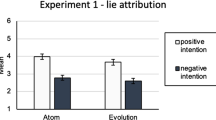Abstract
In this essay I criticize recent attempts to prove that the concept of lying does not include the intent to deceive. I argue that examples by Isenberg and Carson fail to prove that one can lie without intending to deceive and, furthermore, that untoward consequences would follow if these authors were correct. I conclude that since intending to deceive is indeed a necessary condition of lying, the class of statements that constitute lies is smaller than what Isenberg et al. would suggest. Hence the class of deceptive advertisements is also correspondingly smaller.
Similar content being viewed by others
Author information
Authors and Affiliations
Additional information
Gary E. Jones is Associate Professor at the Philosophy Department of the University of San Diego. He won the Review of Metaphysics Dissertation Essay Contest, 1977 and he holds fellowship of the University of Cincinnati and the University of Tennessee. His most important publications are ‘The State and the Right to Health Care’ (in Philosophical Quarterly), ‘Rights and Desires’ (in Ethics), ‘Vindication, Hume, and Induction’ (in Canadian Journal of Philosophy), ‘Engelhardt on Abortion and the Euthenasia of Defective Infants’ (in Linacre Quarterly) and ‘Clendinnen, Jackson and Induction’ (in Philosophy of Science).
Rights and permissions
About this article
Cite this article
Jones, G.E. Lying and intentions. J Bus Ethics 5, 347–349 (1986). https://doi.org/10.1007/BF00383102
Issue Date:
DOI: https://doi.org/10.1007/BF00383102




